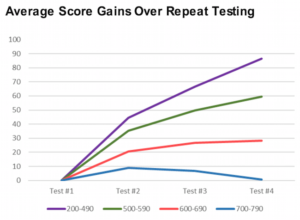
Source: GMAC, July 2016
GMAC says that two of every three test takers score between 400 and 600. Where do you fall on the GMAT spectrum at the moment, and are you planning to take the test again? If so, you could be in good company.
Poets & Quants reports that 28% of all test takers now take the GMAT at least twice if not more times, up from the historical level of 22% to 24% before testing year 2016.
An analysis from GMAC on the latest data shows that candidates who take the GMAT exam a second time have an average score increase of just over 30 points, which could be a big deal if you are close to, but not quite at the average GMAT marker for your target school. (See our previous post on Average GMAT Scores at Top US Business Schools here).
“We see a broad range of score changes, from -100 to +150 points,” according to Ashok Sarathy, vice president of product management at GMAC. “The level of improvement in a test taker’s performance is dependent on a number of factors, including, the approach towards the first exam and the extent and nature of their test preparation. Those that initially score in the lower score bands do present themselves with a greater opportunity to see a larger gain over repeat testing.”
Test takers scoring between 500 – 590 on their first test gain an average of 60 points by the fourth time they have taken the test. Test takers scoring between 700 and 790 on their first attempt gain only ten points on their second attempt, and do not gain any points by the fourth attempt.
Rising average GMAT scores are pushing prospective applicants harder and harder, and there is no downside to taking the test multiple times, other than the preparation time or the $250 testing fee. Test takers can now view and cancel disappointing scores within 72 hours, with no record of the score reported to schools; scores that have been cancelled since January 2014 can be reinstated at any point. Students previously had to wait 30 days between test days, and now only have to wait 16 days, increasing the number of re-takes before application deadlines. There is very little reason not to take the test multiple times, as long as you have been diligent in your preparation.
What Else Matters?
After you have taken the GMAT once, twice, or the full five times in a year allowed by GMAC, what else matters in your application strategy?
The GMAT emphasizes your command of quantitative and language skills, and the rest of your application emphasizes things like your track record, your soft skills, your potential for leadership and future career success, and any unique expertise or accomplishments you have had in your career to date. You might choose to emphasize things like interdisciplinary communication skills, or deep expertise in a relevant area, like FinTech, Entrepreneurship, or Fashion, or Technology in the rest of your application.
Communicating your story in the right way – why this is the correct time for you to pursue an MBA, why [school name] is the right school for you, and why you will be a wild success if given the opportunity to attend – is a highly complex challenge. At Transcend Admissions Consultants, we go out of our way to help prospective applicants think through all of these elements in depth, and prepare them to shine on their essays (as we have written in this article, and this article), letters of recommendation, and in interviews, and try to level the playing field by making this information accessible as possible.
If you have invested time, energy and attention into raising your GMAT score, it makes sense to take advantage of the runway you have built, and ensure that the rest of your application is just as strong as your test scores.
We have compiled a vast array of resources on our Admissions Blog to try and assist you in crafting the best possible application. If you find yourself wanting additional guidance on specific questions, in creating the perfect school selection strategy, or in crafting the narrative of your decision to pursue an MBA, we are always ready to discuss your options and assist however we can.
